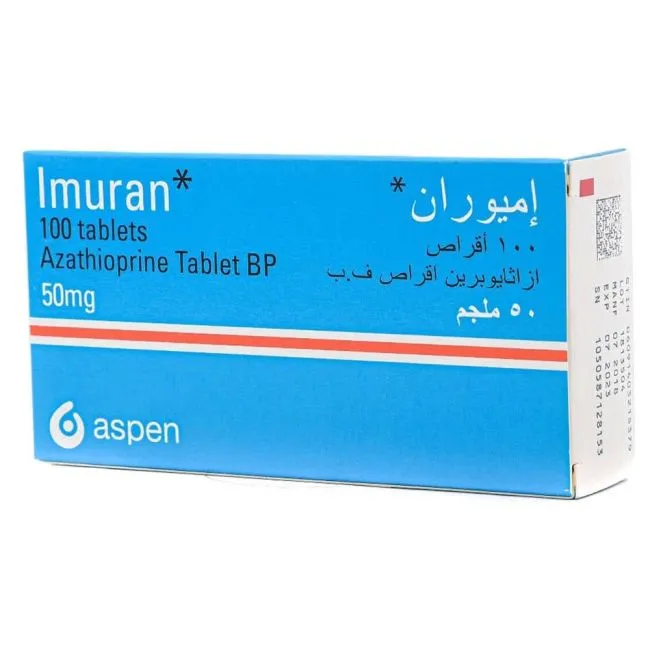Comprehensive Guide to Azathioprine: Uses, Dosage, Side Effects, and More
What is Azathioprine?
Overview
Generic Name: Azathioprine
Brand Name: Imuran, generics
Drug Group: Immunosuppressant
Commonly Used For
- Prevent rejection in renal, hepatic, and cardiac transplant recipients.
- Treat rheumatoid arthritis in patients unresponsive to conventional therapies.
- Manage inflammatory bowel diseases (e.g., Crohn’s disease, ulcerative colitis).
- Off-label uses include systemic lupus erythematosus (SLE), myasthenia gravis, or autoimmune hepatitis under specialist guidance.
Key Characteristics
Form: Tablets (25 mg, 50 mg, 100 mg) and intravenous powder for injection (100 mg/vial).

Mechanism: Metabolized to 6-MP, inhibiting purine synthesis and T-cell proliferation.
Approval: FDA-approved (1968 for Imuran) and EMA-approved for transplantation and autoimmune conditions.
Indications and Uses of Azathioprine
Azathioprine is indicated for:
Transplant Rejection Prevention: Reduces immune response in kidney, liver, and heart transplant patients, often with corticosteroids.
Rheumatoid Arthritis: Manages severe cases unresponsive to methotrexate or other disease-modifying antirheumatic drugs (DMARDs).
Inflammatory Bowel Disease (IBD): Controls Crohn’s disease and ulcerative colitis flares.
Off-Label Uses: Treats SLE, autoimmune hepatitis, pemphigus vulgaris, or dermatomyositis under specialist oversight.
Dosage of Azathioprine
Dosage for Adults
Transplant Rejection Prevention:
- Initial: 3–5 mg/kg once daily, starting within 24 hours post-transplant.
- Maintenance: 1–3 mg/kg once daily, adjusted with corticosteroids.
Rheumatoid Arthritis:
- Initial: 1 mg/kg once daily for 6–8 weeks.
- Maintenance: 2–3 mg/kg once daily, maximum 2.5 mg/kg/day.
Inflammatory Bowel Disease:
- Initial: 1–2 mg/kg once daily.
- Maintenance: 1.5–2.5 mg/kg once daily, titrated based on response.
Dosage for Children
Transplant Rejection Prevention:
- Initial: 3–5 mg/kg once daily.
- Maintenance: 1–3 mg/kg once daily, adjusted for weight and tolerance.
IBD or Autoimmune Conditions: 1–2 mg/kg once daily, with a maximum of 2.5 mg/kg/day.
Dosage for Pregnant Women
Dosage Adjustments
Renal Impairment:
- CrCl 10–50 mL/min: Reduce by 50%.
- CrCl <10 mL/min: Avoid or use with extreme caution.
Hepatic Impairment: Reduce dose by 50% in moderate to severe cases; monitor liver function.
TPMT Deficiency: Reduce dose significantly (e.g., 10–20% of standard) or avoid use due to increased toxicity risk.
Elderly: Start with lower doses (e.g., 1 mg/kg/day); adjust cautiously.
Additional Considerations
- Take this active ingredient with or without food at the same time daily.
- Monitor complete blood counts (CBC) and liver function tests weekly during initial therapy, then monthly.
How to Use Azathioprine
Administration: Swallow tablets whole with water, with or without food; reconstitute IV form with sterile water as directed.
Timing: Take once daily, preferably at the same time, or as split doses if prescribed.
Monitoring: Watch for signs of infection, bruising, or jaundice.
Additional Tips:
- Avoid crushing tablets; use liquid formulations if swallowing is difficult.
- Report fever, sore throat, or unusual fatigue immediately.
Contraindications for Azathioprine
- Patients with hypersensitivity to Azathioprine or 6-mercaptopurine.
- Patients with severe bone marrow suppression or pancytopenia.
- Pregnant women unless benefits outweigh risks, due to teratogenic potential.
Warnings & Precautions for Azathioprine
General Warnings
Bone Marrow Suppression: Risk of leukopenia, thrombocytopenia, or anemia; monitor CBC regularly.
Hepatotoxicity: Elevated liver enzymes or jaundice; perform liver function tests.
Infections: Increased susceptibility to bacterial, viral, or fungal infections; screen for active infections.
Malignancy Risk: Long-term use linked to lymphoma or skin cancer; assess risk-benefit ratio.
Allopurinol Interaction: Enhances toxicity; reduce Azathioprine dose to 25–33% if co-administered.
Use in Specific Populations
Pregnancy: Category D; fetal harm reported; use only if essential with monitoring.
Breastfeeding: Excreted in breast milk; avoid during treatment.
Elderly: Higher risk of myelosuppression; monitor closely.
Children: Approved for specific indications; monitor growth and development.
Renal/Hepatic Impairment: Adjust dose in severe cases; avoid if critical.
Additional Precautions
- Inform your doctor about liver disease, prior cancers, or infection history before starting this medication.
- Avoid live vaccines during treatment due to immunosuppression.
Overdose and Management of Azathioprine
Overdose Symptoms
- Severe nausea, vomiting, or diarrhea.
- Bone marrow suppression (e.g., leukopenia, thrombocytopenia).
- Hepatic dysfunction or jaundice.
Immediate Actions
Contact Emergency Services: Call 911 or seek immediate medical help.
Supportive Care: Administer antiemetics, monitor CBC, and provide supportive therapy.
Monitor: Check liver function, blood counts, and renal parameters for 1–2 weeks.
Additional Notes
- Overdose risk increases with TPMT deficiency; store securely.
- Report persistent symptoms promptly.
Side Effects of Azathioprine
Common Side Effects
- Nausea (15–20%)
- Fatigue (10–15%)
- Loss of appetite (8–12%)
- Mild rash (5–10%)
These effects may decrease with dose adjustment.
Serious Side Effects
Hematologic: Unusual bruising, bleeding, or persistent fever (infection risk).
Hepatic: Yellowing of skin/eyes or severe abdominal pain.
Infections: Fever, chills, or signs of sepsis.
Neoplastic: New lumps or skin changes (potential malignancy).
Additional Notes
- Regular monitoring of CBC, liver function, and infection signs is critical.
- Report any unusual symptoms immediately.
Drug Interactions with Azathioprine
This active ingredient may interact with:
Allopurinol: Increases 6-MP levels; reduce Azathioprine dose to 25–33%.
Warfarin: Reduces anticoagulant effect; monitor INR.
ACE Inhibitors: Enhanced myelosuppression; use cautiously.
Sulfasalazine: Additive bone marrow suppression; avoid combination.
Patient Education or Lifestyle
Medication Adherence: Take this immunosuppressant daily as prescribed to manage autoimmune or transplant conditions.
Monitoring: Report infections, bruising, or liver changes immediately.
Lifestyle: Avoid sun exposure and use sunscreen to reduce skin cancer risk.
Diet: No specific restrictions; take with food if nausea occurs.
Emergency Awareness: Know signs of severe infection or liver failure; seek care if present.
Follow-Up: Schedule regular blood tests (CBC, liver function) and specialist visits every 1–3 months.
Pharmacokinetics
Absorption: Well-absorbed orally; peak plasma concentration at 1–2 hours.
Distribution: Volume of distribution ~0.6–0.8 L/kg; 30% protein-bound.
Metabolism: Hepatic conversion to 6-MP via glutathione-S-transferase, further metabolized by TPMT and xanthine oxidase.
Excretion: Primarily urinary (as metabolites, <1% unchanged); fecal excretion minimal.
Half-Life: 3–5 hours (Azathioprine); 0.5–1 hour (6-MP), with active metabolites persisting longer.
Pharmacodynamics
This drug exerts its effects by:
- Converting to 6-MP, which inhibits purine synthesis via IMPDH and HGPRT enzymes.
- Suppressing T-cell and B-cell proliferation, reducing immune-mediated damage.
- Offering efficacy in autoimmune diseases and transplant rejection prevention.
- Requiring TPMT genotyping for personalized dosing to avoid toxicity.
Storage of Azathioprine
Temperature: Store at 15–25°C (59–77°F); protect from moisture.
Protection: Keep in original container, away from light and humidity.
Safety: Store out of reach of children.
Disposal: Dispose of unused tablets per local regulations or consult a pharmacist.
Frequently Asked Questions (FAQs)
Q: What does Azathioprine treat?
A: This medication treats transplant rejection, rheumatoid arthritis, and IBD.
Q: Can this active ingredient cause infections?
A: Yes, increased infection risk is a concern; report fever immediately.
Q: Is Azathioprine safe for children?
A: Approved for specific uses; consult a pediatric specialist.
Q: How is this drug taken?
A: Once daily as a tablet or IV, with or without food.
Q: How long is Azathioprine treatment?
A: Long-term for chronic conditions, with periodic reassessment.
Regulatory Information
This medication is approved by:
U.S. Food and Drug Administration (FDA): Approved in 1968 (Imuran) for transplant and autoimmune diseases.
European Medicines Agency (EMA): Approved for similar indications.
Other Agencies: Approved globally for equivalent uses; consult local guidelines.
References
- U.S. Food and Drug Administration (FDA). (2023). Imuran (Azathioprine) Prescribing Information.
- Official FDA documentation detailing the drug’s approved uses, dosage, and safety.
- European Medicines Agency (EMA). (2023). Azathioprine Summary of Product Characteristics.
- EMA’s comprehensive information on the medication’s indications and precautions in Europe.
- National Institutes of Health (NIH). (2023). Azathioprine: MedlinePlus Drug Information.
- NIH resource providing detailed information on the drug’s uses, side effects, and precautions.
- World Health Organization (WHO). (2023). WHO Model List of Essential Medicines: Azathioprine.
- WHO’s inclusion of Azathioprine for immunosuppression.
- Annals of the Rheumatic Diseases. (2020). Azathioprine in Rheumatoid Arthritis and IBD.
- Peer-reviewed article on Azathioprine efficacy (note: access may require a subscription).
